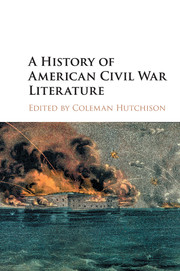Book contents
- Frontmatter
- Dedication
- Contents
- List of Illustrations
- Notes on Contributors
- Preface
- Acknowledgments
- Part I Contexts
- 1 Harriet Beecher Stowe and the “Book That Made This Great War”
- 2 The American Book Trade and the Civil War
- 3 The Transatlantic History of Civil War Literature
- 4 The “American Renaissance” after the American Civil War
- 5 The Realists’ Civil War
- Part II Genres
- Part III Figures
- Recommendations for Further Reading
- Index
1 - Harriet Beecher Stowe and the “Book That Made This Great War”
from Part I - Contexts
Published online by Cambridge University Press: 05 December 2015
- Frontmatter
- Dedication
- Contents
- List of Illustrations
- Notes on Contributors
- Preface
- Acknowledgments
- Part I Contexts
- 1 Harriet Beecher Stowe and the “Book That Made This Great War”
- 2 The American Book Trade and the Civil War
- 3 The Transatlantic History of Civil War Literature
- 4 The “American Renaissance” after the American Civil War
- 5 The Realists’ Civil War
- Part II Genres
- Part III Figures
- Recommendations for Further Reading
- Index
Summary
“So you're the little woman who wrote the book that made this great war!” Lincoln's greeting to Harriet Beecher Stowe at their meeting on 2 December 1862 has become a commonplace of literary scholarship. The reference is to the colossal impact of Uncle Tom's Cabin – a global best seller and the first American novel to sell more than a million copies – and is supported by a number of indices: frenzied Southern attempts to counter its portrayal of slavery in a plethora of “Anti-Tom” novels; children's versions; dramatic adaptations leading to the growth of “Tom troupes” who performed nothing else; and the abundance of what we would today call “tie-ins”: Topsy dolls, board games, Staffordshire figurines, wallpaper, sheet music, and even socks. In the run-up to the Civil War it was possible to read Uncle Tom's Cabin yourself, read it in abridged form to your children, see it on stage, weep over it into an Uncle Tom handkerchief, and recover over supper on an Uncle Tom plate. But did it cause the war? Daniel R. Vollaro has demonstrated that Lincoln's greeting is entirely apocryphal. The story persists partly because it reflects well on Lincoln and Stowe as kindred abolitionists, despite the initially moderate antislavery stance of both, in an intellectual climate where we are eager “to make literature a lever of social or political change”.
Was Uncle Tom's Cabin inflammatory? Or did it set out to promote union and moderation? Arguments have been made on both sides. Vollaro finds the influence of the novel in sparking the war difficult to prove. Most abolition leaders said comparatively little about it, especially the Garrisonians, and there were negative Northern reviews, although the invective from the South was unrestrained. (Stowe received death threats and was sent a severed slave ear in the post.) Mob violence against abolitionism was commonplace in the North, and many Americans remained ambivalent about slavery right up to the outbreak of war. Vollaro is persuasive but unfortunately confines his arguments to the novel per se, something of a straw target.
- Type
- Chapter
- Information
- A History of American Civil War Literature , pp. 3 - 16Publisher: Cambridge University PressPrint publication year: 2015



